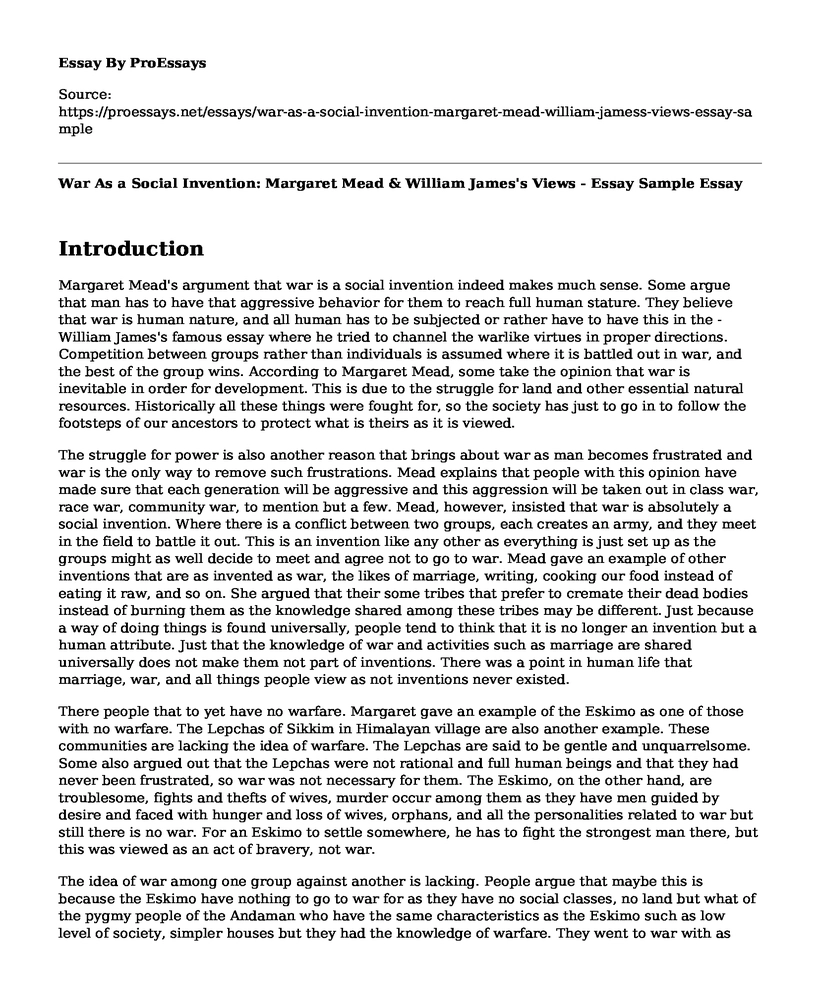Introduction
Margaret Mead's argument that war is a social invention indeed makes much sense. Some argue that man has to have that aggressive behavior for them to reach full human stature. They believe that war is human nature, and all human has to be subjected or rather have to have this in the - William James's famous essay where he tried to channel the warlike virtues in proper directions. Competition between groups rather than individuals is assumed where it is battled out in war, and the best of the group wins. According to Margaret Mead, some take the opinion that war is inevitable in order for development. This is due to the struggle for land and other essential natural resources. Historically all these things were fought for, so the society has just to go in to follow the footsteps of our ancestors to protect what is theirs as it is viewed.
The struggle for power is also another reason that brings about war as man becomes frustrated and war is the only way to remove such frustrations. Mead explains that people with this opinion have made sure that each generation will be aggressive and this aggression will be taken out in class war, race war, community war, to mention but a few. Mead, however, insisted that war is absolutely a social invention. Where there is a conflict between two groups, each creates an army, and they meet in the field to battle it out. This is an invention like any other as everything is just set up as the groups might as well decide to meet and agree not to go to war. Mead gave an example of other inventions that are as invented as war, the likes of marriage, writing, cooking our food instead of eating it raw, and so on. She argued that their some tribes that prefer to cremate their dead bodies instead of burning them as the knowledge shared among these tribes may be different. Just because a way of doing things is found universally, people tend to think that it is no longer an invention but a human attribute. Just that the knowledge of war and activities such as marriage are shared universally does not make them not part of inventions. There was a point in human life that marriage, war, and all things people view as not inventions never existed.
There people that to yet have no warfare. Margaret gave an example of the Eskimo as one of those with no warfare. The Lepchas of Sikkim in Himalayan village are also another example. These communities are lacking the idea of warfare. The Lepchas are said to be gentle and unquarrelsome. Some also argued out that the Lepchas were not rational and full human beings and that they had never been frustrated, so war was not necessary for them. The Eskimo, on the other hand, are troublesome, fights and thefts of wives, murder occur among them as they have men guided by desire and faced with hunger and loss of wives, orphans, and all the personalities related to war but still there is no war. For an Eskimo to settle somewhere, he has to fight the strongest man there, but this was viewed as an act of bravery, not war.
The idea of war among one group against another is lacking. People argue that maybe this is because the Eskimo have nothing to go to war for as they have no social classes, no land but what of the pygmy people of the Andaman who have the same characteristics as the Eskimo such as low level of society, simpler houses but they had the knowledge of warfare. They went to war with as little as fifteen men in (Oxford University Press, 2006[HARDCOVER]) open battles. So Margaret is without a doubt right as to war is nothing but a social invention. Communities adapt to what their ancestors did, either war or no war.
The idea of war may be how situations are handled in particular societies and others that limit the idea of war and have other ways of settling their disputes. Some communities who have no warfare even submit to invaders as there is nothing to be done as they can never go to war to defend themselves. There also other tribes that go to war just for glory, not quarrel at all with the enemy. In such tribes, war is a significant invention and has to happen as it is the only way. War is, therefore, an old invention according to Mead, that is just believed to be a human attribute.
References
Mead, M. (2003). Sex and Temperament in Three Primitive Societies (1st Perennial ed.). New York, NY: Perennial an impr. of Harper Collins Publ.(Original work publisehd in 1935).
Mead, M. (1926). The methodology of racial testing: its significance for sociology. American Journal of Sociology, 31(5), 657-667. Retrieved from https://www.journals.uchicago.edu/doi/abs/10.1086/213952
Sullivan, G. (2012). Paul Shankman. The Trashing of M argaret M ead: Anatomy of an Anthropological Controversy. Madison, WI: University of Wisconsin Press, 2009. 299 pp. $29.95 (paperback). ISBN13: 9780299234546. Journal of the History of the Behavioral Sciences, 48(3), 291-292. Retrieved from https://onlinelibrary.wiley.com/doi/abs/10.1002/jhbs.21557
Cite this page
War As a Social Invention: Margaret Mead & William James's Views - Essay Sample. (2023, Mar 01). Retrieved from https://proessays.net/essays/war-as-a-social-invention-margaret-mead-william-jamess-views-essay-sample
If you are the original author of this essay and no longer wish to have it published on the ProEssays website, please click below to request its removal:
- The September 11 Attacks - Research Paper
- Justice Ruth Bader Ginsberg Essay
- Paper Example on Greeks, Romans, Kings, Crusaders of Genesis and Exodus
- Essay Example on Exploring Humanity: Unraveling Past & Present
- Essay Sample on Passing: Exploring Racism, Belonging & Vulnerability in Harlem Renaissance
- Essay Example on Women in Colonial America: Role and Experiences
- Essay Example on Israel-Palestine Conflict: A Century-Old Dispute Over Land







